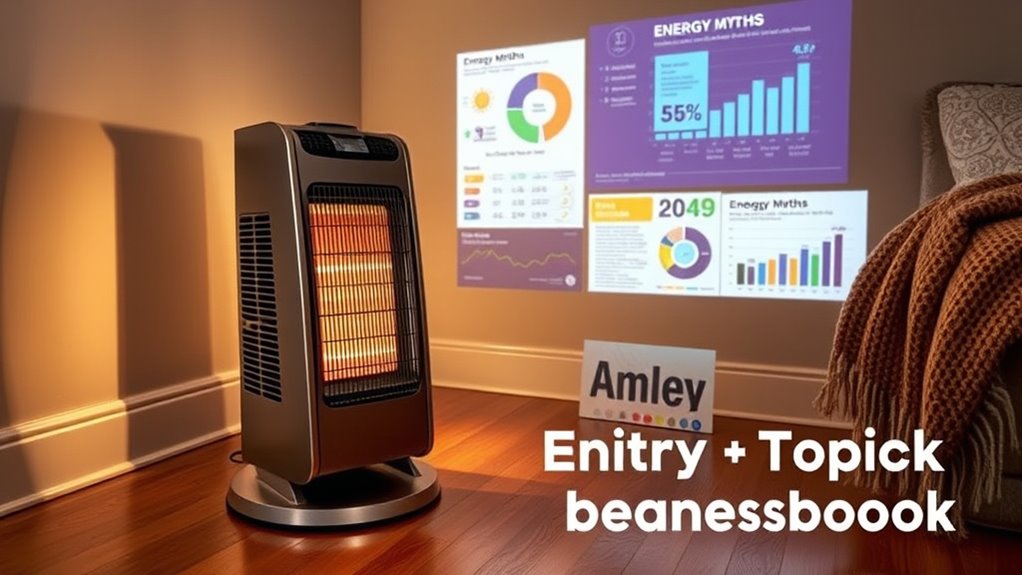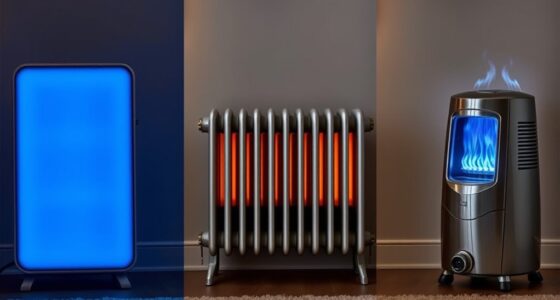This playbook helps you understand and debunk common myths about space heater efficiency and energy savings. It explains how factors like insulation and proper thermostat use impact heating costs, and how to interpret energy labels and utilize calculators for smarter decisions. By understanding the science behind claims and practical tips, you can choose the best heaters for your needs safely and efficiently. Keep exploring to discover more ways to optimize your home heating strategies.
Key Takeaways
- The playbook clarifies common misconceptions about space heater efficiency, safety, and energy savings.
- It explains how insulation, thermostat use, and heat transfer methods impact heater performance.
- The calculator helps analyze cost implications based on usage patterns, settings, and energy rates.
- Practical tips emphasize safe, efficient operation and optimal thermostat settings for savings.
- Interpreting energy labels and using data-driven tools enables smarter, cost-effective heating decisions.
Common Misconceptions About Space Heater Efficiency

Many people assume that space heaters are always inefficient and costly to run, but this isn’t necessarily true. Your home’s insulation quality plays a big role in how effective a space heater can be. Well-insulated rooms retain heat better, meaning your heater doesn’t have to work as hard, saving energy and reducing costs. Additionally, thermostat settings matter—setting your heater too high doesn’t speed up heating; it just wastes energy. By maintaining a moderate, comfortable temperature, you optimize efficiency and avoid unnecessary expenses. Many misconceptions overlook that proper insulation can cut down on heat loss, making space heaters more cost-effective and efficient for smaller areas. Moreover, understanding how AI Security influences technology can help you stay informed about developments that might improve energy management systems. Understanding these factors helps you use your space heater wisely, dispelling myths about inefficiency.
How the Energy Myths Affect Your Heating Choices
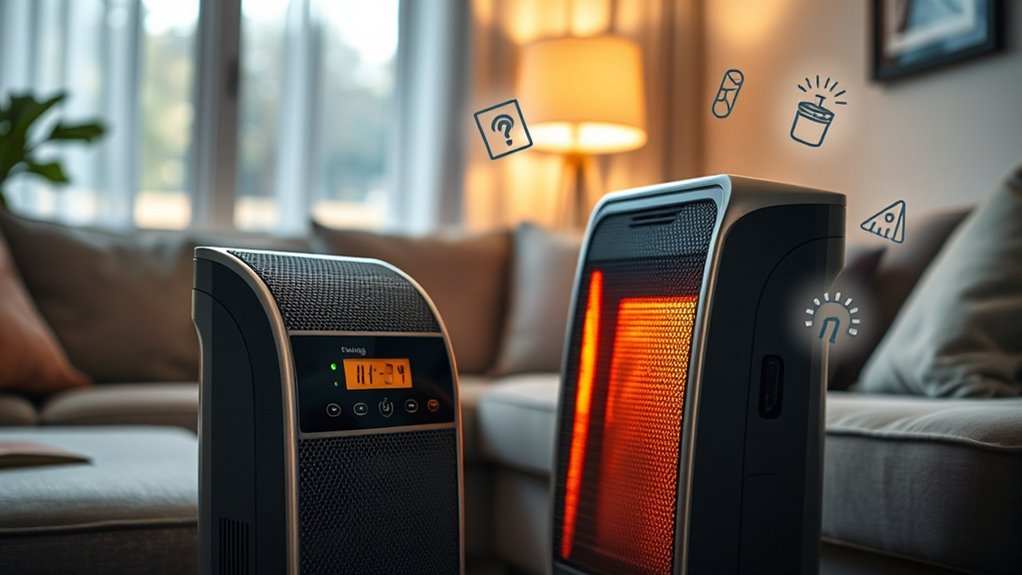
Misconceptions about space heater efficiency can substantially influence your heating decisions. If you believe certain myths, you might choose a heater based on false ideas about energy savings, leading to higher bills or inadequate warmth. For example, thinking that larger or more powerful heaters always save energy can cause you to overspend without benefits. Additionally, these myths can compromise safety considerations if you ignore proper use or maintenance, risking fire or injury. Believing that space heaters are inherently unsafe might make you hesitant to use them effectively, reducing comfort and increasing reliance on less efficient heating sources. By understanding how these myths distort your choices, you can select the right heater, maximize energy savings, and prioritize safety, leading to smarter, more effective heating decisions. Informed decision-making is essential to dispel these myths and choose the most suitable heating solution for your needs.
Understanding the Science Behind Space Heater Claims
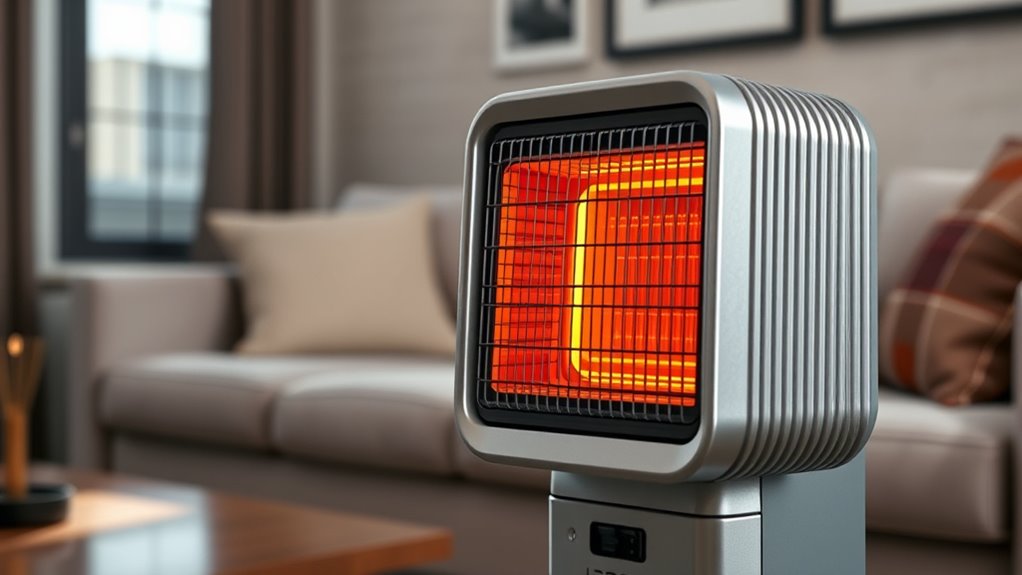
To understand space heater claims, you need to look at how efficiently they convert energy into heat. Knowing the basics of heat transfer—like conduction, convection, and radiation—helps you see what makes some heaters more effective than others. Grasping these scientific principles allows you to make smarter, more informed decisions about your heating options. Additionally, understanding Kia Tuning options can provide insights into how modifications affect performance and efficiency in related mechanical systems.
Energy Conversion Efficiency
Understanding the science behind space heater claims requires examining how efficiently they convert electrical energy into heat. Most electric heaters have high energy conversion efficiency because nearly all the electrical energy they use turns into heat, often close to 100%. However, this efficiency depends on factors like thermal insulation, which keeps heat inside your space, reducing wasted energy. The type of energy source also matters; electric units directly convert electricity, avoiding losses common in fuel-based systems. When evaluating a heater’s efficiency, consider how well it minimizes heat loss through good insulation and effective design. Additionally, recent AI discoveries suggest that integrating AI-driven solutions can optimize heating systems for better energy conservation. While electric heaters are generally efficient at transforming energy into warmth, the overall energy savings depend on how well your space retains heat and how the heater interacts with your home’s insulation.
Heat Transfer Mechanics
Heat transfer is the fundamental process that determines how effectively a space heater warms your room. It involves three main methods: conduction, convection, and radiation. Understanding these helps you evaluate heater claims better. For example, noise levels of modern heat pumps are designed to minimize energy waste and improve comfort, which relates to efficient heat transfer mechanisms. 1. conduction: Heat moves through solid materials; high thermal conductivity materials transfer heat faster. 2. convection: Air circulates, carrying heat away from the heater, influenced by heat dissipation efficiency. 3. radiation: Infrared waves directly heat objects and people, bypassing air. 4. heat dissipation: How well a heater manages excess heat impacts its performance, safety, and energy use. Knowing these mechanics allows you to see through myths and select a heater that efficiently transfers heat, rather than just wasting energy through poor heat dissipation.
Debunking Myths About Whole-House Heating and Space Heaters

Many people believe that whole-house heating is always more efficient than using space heaters, but that’s not true in every situation. Understanding the common myths and facts can help you make smarter choices about heating your home. Let’s clarify what’s real and what’s just a misconception. A heat pump with advanced features can provide both heating and cooling efficiently, making it a versatile choice for various climates.
Common Whole-House Heating Myths
Despite what some believe, whole-house heating systems are not always inefficient or overly costly. Many myths persist, like the idea that they are too expensive to operate or only suitable for cold climates. In reality, options like solar heating and geothermal systems can *considerably* lower energy costs and improve efficiency. Here are common myths debunked:
- Whole-house systems are always expensive—modern options can be budget-friendly.
- They waste energy—advanced thermostats and zoned heating optimize usage.
- They’re ineffective for cold climates—geothermal systems work well even in harsh weather.
- Solar heating can supplement or replace traditional systems, reducing reliance on fossil fuels.
- Data-driven marketing strategies play a crucial role in promoting energy-efficient solutions, helping consumers understand the benefits of advanced heating options.
Understanding these facts helps you make smarter choices for whole-house heating.
Space Heaters Efficiency Facts
While whole-house systems often get a bad rap for inefficiency, space heaters are frequently misunderstood when it comes to their energy use. Many believe they consume excessive energy, but proper thermostat settings can make a big difference. By setting your space heater to the right temperature, you avoid wasting energy and optimize efficiency. Additionally, investing in energy-efficient upgrades, like models with programmable timers or insulation, enhances performance. Unlike common myths, space heaters can be cost-effective for small areas when used correctly. They don’t have to be energy hogs if you’re mindful of settings and choose efficient units. Regularly checking and maintaining filters and internal components, as recommended in Aero Guardians, helps ensure the heater operates at peak efficiency. Understanding these facts helps you make smarter choices and dispels the misconception that space heaters are inherently inefficient.
The Truth About Cost Savings With Portable Heaters

Portable heaters can seem like a cost-effective way to warm a room, but their actual savings depend on how you use them. A proper cost analysis shows that while they may reduce heating bills initially, frequent use can increase overall expenses, especially if the appliance isn’t durable. To maximize savings:
Portable heaters can save money if used wisely and maintained properly.
- Choose energy-efficient models with proven appliance durability.
- Use the heater only in occupied spaces to avoid unnecessary energy use.
- Set thermostats to ideal temperatures to prevent waste.
- Regularly maintain the heater to ensure it runs efficiently and lasts longer.
- Be aware of affairs related to digital communications, as emotional or virtual distractions can increase unnecessary energy use or neglect household heating management.
Factors That Influence a Space Heater’s Energy Consumption
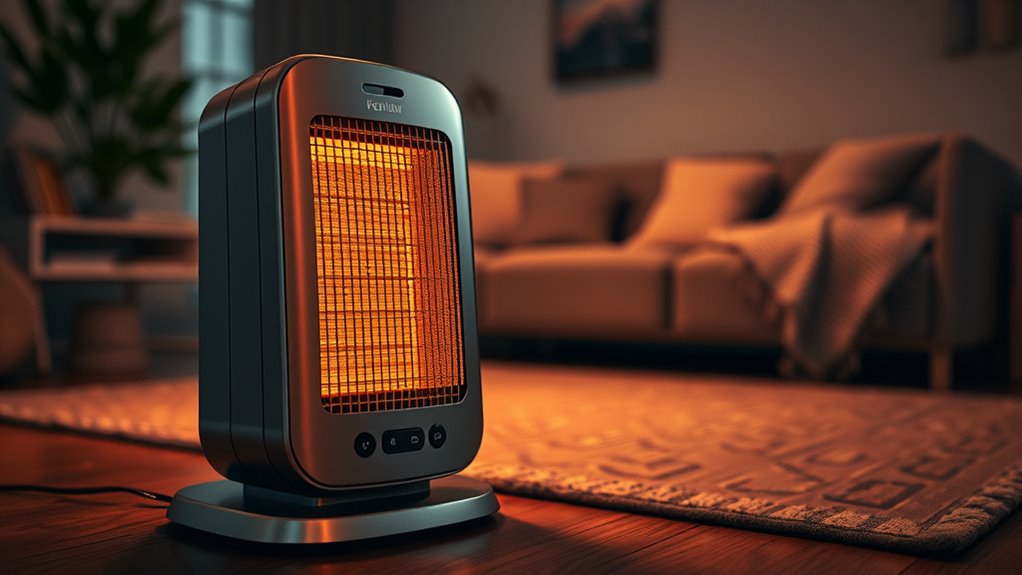
Your space heater’s energy use depends on several key factors. The size and output of the heater, how well your space is insulated, and how long you run it all impact your energy consumption. Understanding these elements helps you choose and operate your heater more efficiently. Additionally, considering the projector technology can influence overall energy efficiency in a home cinema setup.
Heater Size and Output
The size and output of a space heater directly impact how much energy it consumes, making it important to choose the right one for your space. Proper heater sizing ensures efficient heating without wasting energy. When considering output measurement, understand that a higher wattage typically means more heat but also increased energy use. To select the right heater:
- Assess your room size to determine necessary heater capacity.
- Match heater wattage with the space’s heating needs.
- Avoid oversized heaters that run constantly, wasting energy.
- Use output measurement to compare efficiency between models.
Choosing an appropriately sized heater helps you balance comfort and energy savings, making your heating more effective and economical.
Insulation Effectiveness Levels
Insulation effectiveness plays a crucial role in determining how much energy a space heater consumes. When your space has high insulation effectiveness, it retains heat better, reducing the workload on your heater. Thermal resistance measures how well insulation prevents heat transfer; higher resistance means better insulation. If your walls, windows, and doors have low thermal resistance, heat escapes more easily, causing your heater to work harder and use more energy. Conversely, good insulation minimizes heat loss, allowing your heater to maintain a comfortable temperature efficiently. Understanding the insulation’s thermal resistance helps you gauge how much energy your space heater needs to keep your space warm. Improving insulation can considerably lower energy consumption and enhance overall heating efficiency.
Usage Duration Patterns
How long you run a space heater considerably impacts its energy consumption, as longer usage periods lead to higher electricity use. Your thermostat settings and room size are key factors influencing this pattern. To optimize energy efficiency:
- Keep the thermostat at a moderate setting to prevent unnecessary energy drain.
- Limit heater use to the hours when you’re actually in the room.
- Use timers or smart controls to avoid continuous operation.
- Adjust the heater based on room size—smaller spaces require less time and lower settings.
Using the Calculator to Separate Fact From Fiction
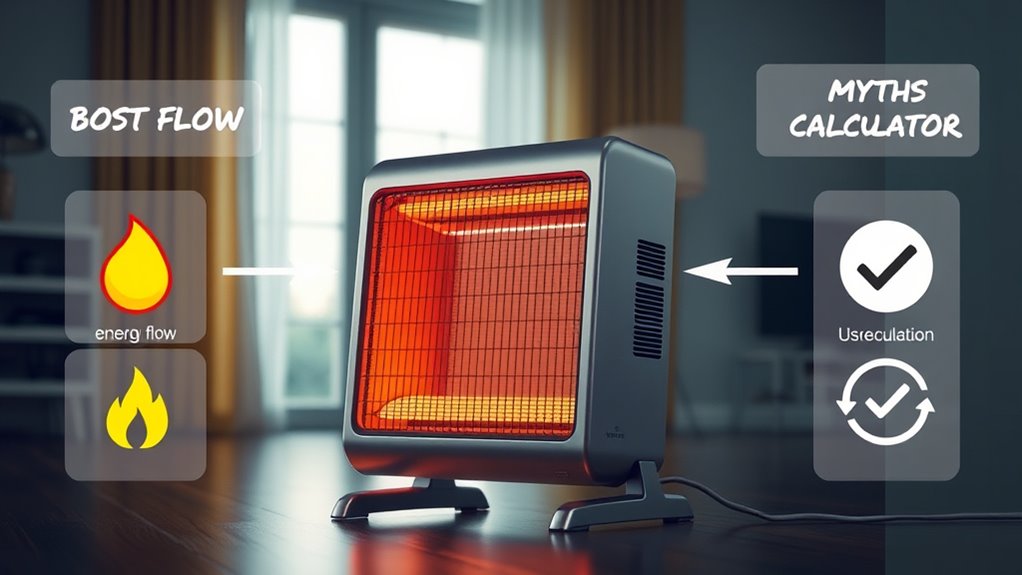
Using a calculator can be a powerful way to cut through the confusion surrounding space heater efficiency myths. It helps you analyze how thermostat settings impact electrical costs and dispel misconceptions about energy use. By inputting your heater’s wattage, expected hours of operation, and your local electricity rate, you can see real cost estimates. This allows you to compare different thermostat settings and understand their effect on energy consumption. The calculator also reveals whether claims about space heaters being energy-efficient are true or exaggerated. Instead of relying on assumptions or myths, you gain clear, factual insights into your actual energy expenses. This empowers you to make smarter decisions about heater use, saving money and avoiding unnecessary energy waste.
Practical Tips for Smarter Space Heater Usage

Once you’ve used a calculator to identify the most energy-efficient thermostat settings, you can start applying practical strategies to maximize savings.
- Maintain proper temperature regulation by setting your space heater to a comfortable but not excessive level, typically around 68°F.
- Use safety features like tip-over and overheat protection to prevent accidents and ensure safe operation.
- Keep doors and windows closed to contain heat and reduce energy waste.
- Regularly clean filters and vents to improve efficiency and prolong your heater’s lifespan.
These tips help you optimize energy use while keeping your space safe. Adjusting temperature regulation with safety features in mind allows smarter, more cost-effective space heater usage.
How to Interpret Energy Labels and Claims Accurately
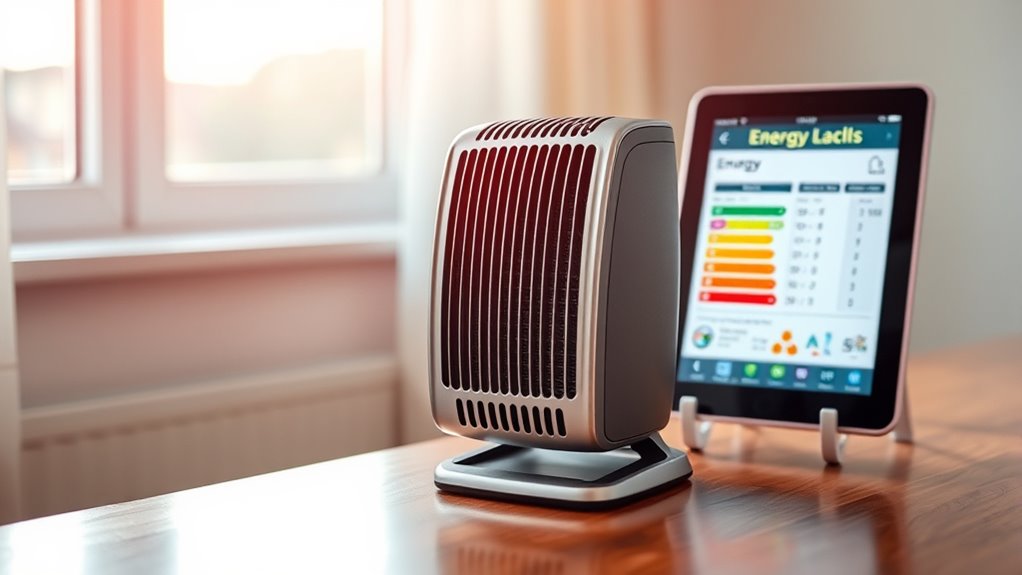
Understanding energy labels and claims is essential for making informed decisions about space heaters. These energy labels provide vital information about a heater’s efficiency, power consumption, and energy costs. When reading energy labels, focus on key metrics like wattage, energy efficiency ratings, and annual energy use estimates. Be aware that some claims can be misleading or exaggerated—this is where myth interpretation comes into play. Don’t fall for buzzwords or vague statements; instead, verify claims against the actual data on the label. Accurate interpretation helps you compare models objectively and avoid overestimating a heater’s efficiency or savings. By understanding how to interpret energy labels correctly, you guarantee your choice is based on facts, not myths, leading to smarter, more efficient heating decisions.
Making Informed Decisions: The Playbook’s Key Takeaways
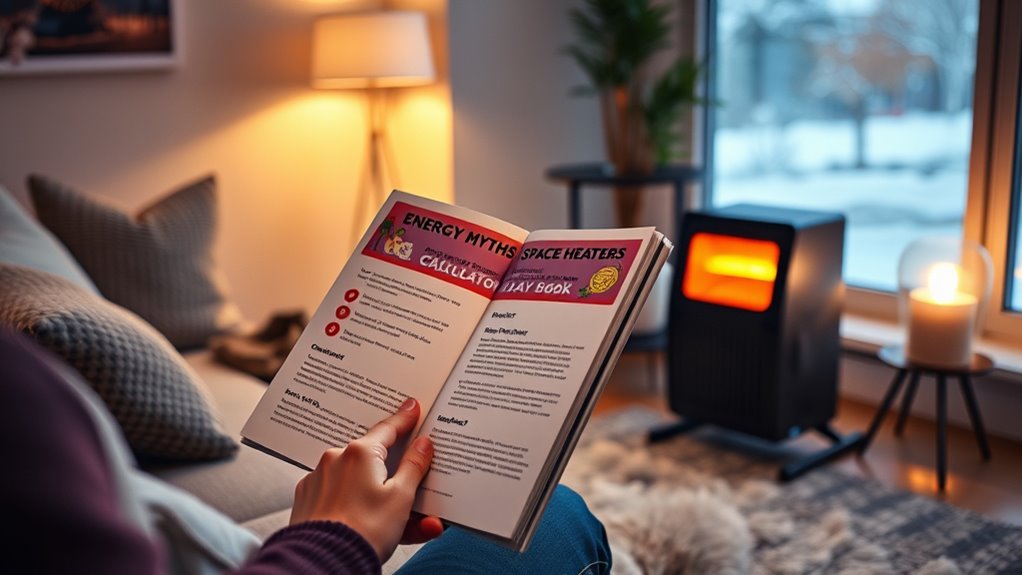
Making informed decisions about space heaters starts with knowing where to look beyond just the marketing claims. To improve your consumer awareness, focus on these key takeaways:
- Prioritize energy efficiency ratings to ensure you’re choosing a heater that conserves power and reduces costs.
- Read reviews and independent tests to verify manufacturer claims and avoid false advertising.
- Understand the actual energy consumption, not just the advertised wattage, for realistic expectations.
- Balance initial cost with long-term savings by considering durability and efficiency over time.
Frequently Asked Questions
Can Space Heater Myths Impact My Overall Home Energy Efficiency?
Yes, space heater myths can impact your home’s energy efficiency. Believing false claims might lead you to set your thermostat improperly or neglect insulation quality, causing unnecessary energy use. For example, thinking space heaters save energy by running constantly can increase costs. Instead, you should optimize thermostat settings and improve insulation, ensuring your space heater works efficiently without wasting energy. These adjustments help you save money and stay comfortable.
Are There Specific Brands More Prone to Exaggerated Energy Claims?
Some brands are more prone to exaggerated energy claims due to their marketing exaggerations and reputation management. You should research brand reputation and customer reviews to spot misleading advertisements. Be cautious of companies that boast unrealistically high efficiency ratings or energy savings. Trust brands with transparent product information and positive feedback. This way, you can avoid falling for exaggerated claims and choose a space heater that genuinely meets your energy efficiency needs.
How Often Should I Recalibrate My Space Heater for Optimal Efficiency?
Think of your space heater like a finely tuned instrument; it needs regular tuning to perform at its best. You should recalibrate your thermostat every 1-2 years and perform routine heater maintenance, like cleaning filters and checking for dust buildup. This guarantees accurate thermostat calibration and keeps your heater running efficiently, saving energy and prolonging its lifespan. Regular maintenance is your key to consistent warmth and energy savings.
Do Energy Labels on Heaters Reflect Real-World Performance?
Energy labels on heaters give you a good idea of their efficiency, but they might not fully reflect real-world performance. The accuracy of energy labels depends on how well they’re based on actual testing conditions. Keep in mind that real world testing can vary due to factors like room size and insulation. So, while labels are helpful, consider user reviews and actual performance data for a complete picture.
What Are Common Mistakes When Using the Energy Calculator?
You often make mistakes when using the energy calculator by not accurately inputting the heater’s power consumption or underestimating how your user behavior impacts energy use. Be sure to double-check the power consumption figures and consider how often you’ll use the heater daily. Ignoring these factors leads to inaccurate estimates, so stay mindful of your habits and the actual specs to get the most reliable results.
Conclusion
Now that you’ve uncovered the truth behind space heater myths, you hold the power to make smarter, energy-efficient choices. Don’t let misconceptions cloud your judgment—your comfort and wallet deserve clarity. Think of this knowledge as a guiding light in the darkness of misinformation, leading you to savings and smarter heating. With the right tools and understanding, you can turn your space into a cozy haven without sacrificing your peace of mind.
